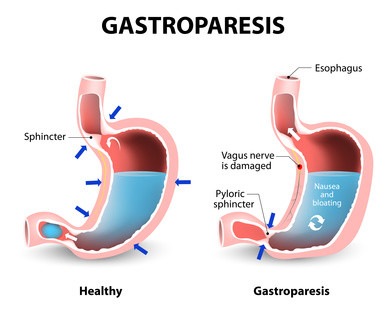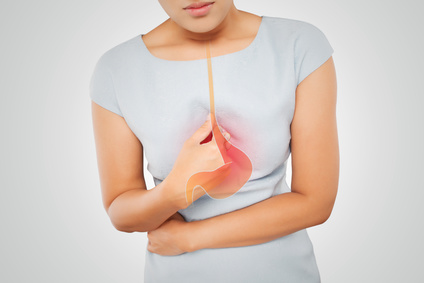Empty Stomach Feeling – Causes and Other Symptoms
The stomach is constantly emptying after meals to slowly release partially digested food into the small intestine. This is a normal part of digestion. When the stomach is empty for long periods and if the blood glucose levels are low, we feel this emptiness as the sensation of hunger. However, sometimes this empty stomach feeling persists despite eating. This may be a symptom of some underlying stomach problem.
Why does the stomach feel empty?
The stomach can shrink and expand significantly depending on the quantity of food within it and the period of time since the last meal. The empty stomach feeling that most people experience are often associated with hunger and referred to as hunger pangs. It is a result of strong stomach contractions along with increased acid and enzyme secretions. Along with an increased appetite and low blood glucose levels, it signals a need to consume food.
Read more on normal stomach emptying.
With eating, the stomach wall stretches to accommodate the food entering it. Normally the empty feeling becomes less with continued eat. Stretching of the stomach to a certain point where the stomach feels full along with a sense of satiety signals the body that there was sufficient food intake for the interim. This is opposite to the empty stomach feeling. However, abnormal sensations such as cramping, discomfort, burning and pain may sometimes be mistaken for an empty stomach feeling.

Other Signs and Symptoms
An empty stomach feeling may occur on its own without any other sensations of symptoms. When the empty stomach feeling occrs due to hunger, it is not uncommon for increased salivation, loud stomach noises (borborygmi) and even nausea to be present in some instances.
However, when the empty stomach feeling occurs due to stomach problems then a host of other symptoms may also occur. This includes:
- Stomach discomfort and pain
- Heartburn
- Nausea and sometimes vomiting
- Changes in appetite
- Unusual tastes
These symptoms are common to most of the stomach and associated conditions that cause an empty stomach feeling. However, there may be various other symptoms that may occur which are specific to certain stomach diseases.
Causes of Empty Stomach Feeling
It is important to differentiate between hunger and an empty stomach feeling that is a symptom of some stomach conditions. The sensation of hunger subsides with eating and should not return for hours, depending on the quantity of food that is consumed. Even the type of food can affect the duration before the hunger sensation returns.
However, when the empty stomach feeling occurs due to a stomach problem then it may not subside with eating. If it does ease then this may only be temporary or at times the sensation worsens with eating. The reason why the latter may occur is that stomach acid increases immediately before and during a meal. Stomach contractions also increase which could contribute to pain and discomfort.
Gastritis
Gastritis is one of the common causes of an empty stomach feeling. The inflammation of the stomach wall can occur for various reasons but H.pylori (Helicobacter pylori) infection and the excessive use of drugs like NSAIDs are the most common causes of gastritis. The stomach acid constantly irritates the already inflamed stomach wall which is perceived as an empty stomach feeling.
Peptic Ulcers
Peptic ulcer disease (PUD) is another common cause of an empty stomach feeling that persists despite eating. These open sores in the stomach and duodenal wall occur for many of the same reasons as gastritis. The empty stomach feeling often worsens with hunger. It accompanies upper abdominal pain and may be temporarily eased by eating, only to return a short while thereafter.
Acid Reflux
Acid reflux, also known as gastroesophageal reflux disease (GERD), is a common condition. GERD involves the esophagus (food pipe) where stomach acid and enzymes flow backward into it. This occurs with a weakening of the lower esophageal sphincter (LES). The acid and enzymes irritate the esophageal lining (esophagitis). The heartburn and nausea may sometimes be mistaken for an empty stomach sensation similar to hunger.

Esophageal Ulcers
Open sores in the esophagus (food pipe) occur for several reasons, such as severe and prolonged acid reflux as well as H.pylori infection. These esophageal ulcers often arise in the lower esophagus, near the stomach. The pain and discomfort cause by these ulcers can sometimes also be mistaken for an empty stomach feeling. Some people tend to respond by increasing food consumption.
Bile Reflux
Bile reflux is a less common condition but can also be responsible for certain symptoms that may be described as an empty stomach feeling. Bile is secreted from the gallbladder into the duodenum (first part of the small intestine). The bile may enter the stomach and even extend into the esophagus. Bile reflux often accompanies acid reflux but symptoms may involve both the stomach and esophagus.
Hiatal Hernia
Hiatal hernia is not often associated with an empty stomach feeling but the discomfort and pain may be perceived as such by some people. It is more often a squeezing pain which may be accompanied by acid reflux. A portion of the stomach becomes trapped in the small opening on the diaphragm as it protrudes through into the chest cavity.
Inflammatory Bowel Disease
Crohn’s disease, one type of inflammatory bowel disease (IBD), can affect areas beyond the intestines such as the stomach. It causes extensive inflammation of the stomach wall and there may also be ulcer formation in the affected tissue. The inflammation and ulceration leads to pain and discomfort. This may be perceived as an empty stomach feeling.
Anxiety and Stress
Stomach symptoms are common with certain mental states, such as anxiety and psychological stress. An empty stomach feeling, a hollow stomach feeling or even ‘butterflies in the stomach’ are some of the sensations described with these psychological states. It may be due to increased stomach acid secretion that can occur with certain emotions but may also be perceived for no clearly identifiable physiologic reason. This empty stomach feeling is therefore psychogenic.
Read more on nervous stomach.
Other Causes
Last updated on August 31, 2018.





